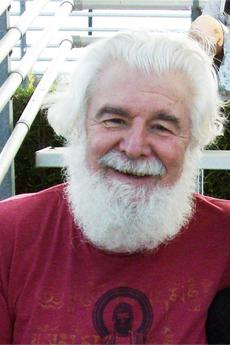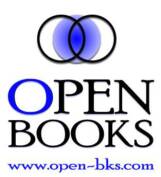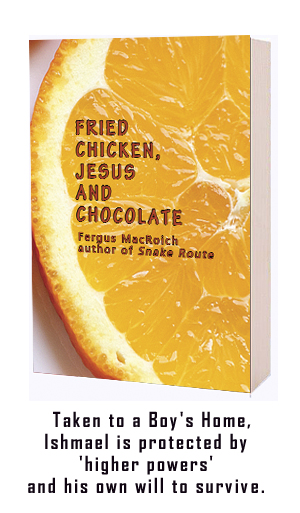Interview
Moronic Ox Talks with Author Fergus MacRoich
MO: We have read that you began writing to literally ‘save your life’. Can you give provide a little background to further define that statement?nt?
Fergus MacRoich: When I was growing up in Brooklyn, my stepfather was very paranoid of people because of his past in the Soviet Union and in Germany. After the war, he had become a wanted man. Because of his illness, I was not allowed to have friends and I spent my time alone mostly on the roof of our Brooklyn tenement where I read and studied and also kept a notebook with verses that I wrote in secrecy. The poetry I wrote was a window that allowed my soul to escape from the harsh reality of our daily life. Literature became my freedom.
MO: Your writing career has at this point spanned several decades. Would you recount your first writing efforts and tell us what they were, how they were received, what they meant to you and what was the outcome of those initial efforts?
Fergus MacRoich: I began writing poetry in French after we moved from Belgium to Philadelphia and then to Brooklyn. I submitted two poems, Coquelicot and La brume to France-Amérique, a New York newspaper published for the French community there and they were both published. At the same time, this was 1963, Tilden High School, which I attended at the time, was having a poetry declamation contest. I translated La brume into English and I won first place. I was elated because of these small but rewarding events in my life. My English teacher, Mrs. Byrnes, encouraged me to write my verses and allowed me to recite a few in class. She also gave me several books of English and American poets to read and we sometimes discussed them after school. She was quite instrumental in my writing “career.” My stepfather, however, was a different story. When I won the poetry contest, he smashed the trophy I had received and told me not to ever write “garbage” again. He wanted me to learn a business, earn a lot of money and become a businessman. The more he pushed the more I pushed back. His ban on my writing only encouraged me to write poetry in secrecy and to hide my verses in the basement.
MO: You have published a number of books throughout your writing career. What are your favorites and why?
Fergus MacRoich: My first real publication was a book of poetry under my real name, Serge Lecomte. It was a book of poetry entitled Crimson Rice. I love this book because of the juxtaposition of violence and beauty of the language. The book was well reviewed by Peggy Schumaker in the Fairbanks News-Miner. The verses in this book are reminiscent of Isaac Babel’s Horse Cavalry. I also love Alaska the Last Frontier, a book of Alaskan poems and Mother Speaks because of their different usage of language. In terms of novels, I love Fried Chicken, Jesus and Chocolate as much as I love Alice in Wonderland and Madame Bovary because I never get tired of reading and reading them. Even though I know the stories in these books, it is the language that gets me excited every time. And Fried Chicken, Jesus and Chocolate is that kind of novel. It’s like a movie that you could watch over and over again because there is always something new to think about. It isn’t mindless writing. The book is an orchard where you can always pick fruit from any of the trees because they’re always in season. The sequel to this novel, Ishmael Crosses the River, is just as exciting because Ishmael comes into his own. He becomes a real human being. Both Fried Chicken, Jesus and Chocolate and Ishmael Crosses the River are magical, especially the latter. I also love Snake Route and Martin the Unknown because of their surreal nature.
MO: Can you give us a little insight as to your particular writing process?
Fergus MacRoich: My mind is fertile with ideas. But these ideas must come with a major character and a vague plot. I usually write them down in a notebook. Sometimes I’ll have three or four ideas and then one will become meatier and more interesting. Chapters will begin to form and so on. Then a year will go by and if the idea is still interesting, it will grab me and lead me through the writing. I usually write from 2 a.m. till 6 a.m., then take a walk and let my mind free to think of the next step. And so on until I have a first draft. Then it will sit for a while. My partner will then read it and suggest changes. Once I have a second draft, it goes to my editor Steven Bauer for a line by line edit and changes in plot and so on. Then I rewrite and then it’s back to him until we’re both satisfied with the work. Once we’re done, it’s publishing time. Forget the big six in NY.
MO: Every writer is influenced by the work of those that have gone before. Who are some of your influences? Which books? Which writers?
Fergus MacRoich: The first things I read as a child were Hergé’s Adventures of Tintin et Milou. These stories took me around the world, to Peru, Arabia, Africa and so on. Then I graduated to Alexandre Dumas’ The Three Musketeers and The Count of Monte Cristo. And let’s not forget Jules Verne. My mother read me Russian fairy tales. When I attended the Royal Atheneum in Brussels I was introduced to the plays (Le malade imaginaire, Le misanthrope) by Molière. They influenced me a lot. They made me laugh and question people around me. Mark Twain’s writing, especially Letters from the Earth, was a great influence. And then there’s Nikolai Gogol’s Dead Souls. I’ve always loved satire. Some of my unpublished novels are pure satire, written in a style that I call American Grotesque. Gustave Flaubert’s Madame Bovary is a beautiful piece of literature. It’s an exquisite gem in terms of language. And there are so many more. And let’s not forget The Little Prince by St, Exupéry, which I read every year to remind me of whom I am.
MO: It might be said that writers are often influenced by the times in which they write. How have events and circumstances within your lifetime influenced your perspective and your writing?
Fergus MacRoich: My life has been a vivid and dramatic force since the day I came to your planet. I was lucky to have been born in poor circumstances in a family of coal miners who were illiterate and to have risen to the literate state I find myself in. Every event in my life has propelled me forward. I have never let anything or anyone defeat me. The characters in my novels come from humble beginnings but they reach for something higher. They have hope. They do not give up. But they are helped by people around them. When my parents attempted suicide after our arrival to the States, my brothers and I were taken to a black welfare home. One week-end my former teacher came to visit. She brought me two books to read, A History of American Clippers and a biography of Albert Schweitzer. These two books are still with me today.
MO: Is there a single character in literature to whom you might compare yourself?
Fergus MacRoich: The Little Prince.
MO: We know that you hold various degrees in literature and in languages. How many languages do you speak? Do you read in languages other than English? How has literature from various cultures affected your own writing?
Fergus MacRoich: I speak five quite fluently and can get along in another four or five. I read French, Russian, Spanish, Italian, English fluently. I have a basic knowledge of Greek, Arabic, German and Portuguese. I don’t know how much these languages have influenced my writing. Stylistically? No. In terms of narrative perhaps. This is hard to gauge. But I can say this much, the characters in my novels are alien to the culture they belong to. And this allows the reader to see the world with fresh eyes whereas most novels written today tend to reflect what the reader wants to see.
MO: How do you view the publishing industry at present? Does it serve the needs of both readers and authors?
Fergus MacRoich: The publishing industry is much larger than it used to be, but because of the thousands of publishing-on-demand outfits (some of which will publish anything and everything without using any sort of quality control) things have become tough for serious writers. Quality fiction is last on most publishers’ lists. There’s more demand for Vampire novels.
MO: Can you relate a particular incident in which you have had a very meaningful encounter or exchange with one of your readers?
Fergus MacRoich: One of my neighbors has read several of my novels. I had expected him not to like Fried Chicken, Jesus and Chocolate, but he amazed me with a glowing review of it. And he’s a republican who is not voting for Trump. You can’t judge your readers by their political affiliations.
MO: As a modern-day novelist, how do you view the future of the novel itself?
Fergus MacRoich: The majority of novels written today are for mass consumption. But good novels and great novels will always exist. There are just more choices for people today.
MO: What are your best hopes for your own works? What are your worst fears for them?
Fergus MacRoich: I am always happy when someone reads my books. I hope that years from now one person will discover my book and enjoy it. I don’t have any fears for my books because once I’m dead, I won’t know what’s happening, will I?
MO: What advice would you offer to younger writers first starting out?
Fergus MacRoich: When I was teaching at the University of Alaska Fairbanks, I often advised in-coming freshmen. On one particular occasion, a young man entered my office to register. He declared his major immediately – creative writing. I asked him who he had read. His reply – no one. He didn’t read other people’s writings because he didn’t want to be influenced. I asked him how old he was. “Eighteen,” he answered. “What will you be writing?” I asked. “Novels,” he answered. “And what are you going to be writing about?” I asked. “ME!” he said.
M y advice to young writers is to go out and live a lot, fall in love, get laid, get a job, travel the real world and make some human connections. Then if you still feel the need to go to college to learn how to write, read and write and write and write. And don’t be afraid of criticism. Write trash if you want to make money and don’t waste your time in school!
© Moronic Ox Literary Journal - Escape Media Publishers / Open Books
Moronic Ox Literary and Cultural Journal - Escape Media Publishers / Open Books Advertise your book, CD, or cause in the 'Ox'
Novel Excerpts, Short Stories, Poetry, Multimedia, Current Affairs, Book Reviews, Photo Essays, Visual Arts Submissions
Fergus MacRoich was born in Belgium and moved to the United States where he spent his early childhood in South Philadelphia and then moved to Brooklyn. After graduating high school, he joined the Medical Corps in the Air Force and was sent to Selma, Alabama during the Civil Rights Movement where he flew helicopter rescue. He received a B.A. in Russian Studies from the University of Alabama and earned a Masters and Ph.D. from Vanderbilt University in Russian Literature with a minor in French Literature. He worked as a Green Beret language instructor at Fort Bragg, NC from 1975-78. In 1988, he received a B.A. from the University of Alaska in Fairbanks in Spanish Literature. He has lived in Mexico, Spain, France, Russia, and Texas, and worked as a language teacher at the University of Alaska (1978-1997). Fergus was also the poetry editor for Paper Radio for several years. He resided on the Kenai Peninsula in Alaska for 15 years and has recently moved to Bellingham, Washington.
About the Book...
In Fried Chicken, Jesus and Chocolate, Ishmael is born to a heroin addicted mother whom he thinks is a spider. Much of his time while growing up is spent eating fried chicken and watching cartoons. When his mother overdoses Ishmael goes to live with Grandma Cecilia, who impresses the teachings of Jesus upon him. After Grandma Cecilia is murdered, Ishmael is taken to a Boy's Home where he is abused but is protected by 'higher powers' and his own will to survive.
Fried Chicken, Jesus and Chocolate is as much about storytelling as it is about style, and the ending is as magical and fantastical as some of the moments in Ishmael's life.




